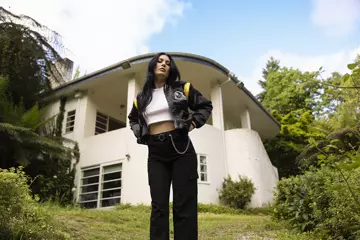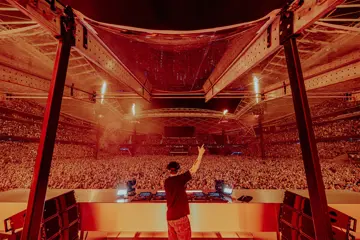Pacifier play the Nambour RSL on July 4, the Waterloo Hotel July 5 and the Troccadero, Surfers Paradise on July 6.
Most bands that’ve been going for ten-plus-years tend to be pretty settled on their name, especially if they’re in the most successful phase of their career to date, and about to make real inroads in the notoriously difficult American market. But for ex-pat Kiwis Pacifier, formerly Shihad, certain recent world events made their former moniker a little hard to explain to your average hysterical Yank.
“Well, it’s simple, someone flew some shit into a building and everyone said the reason why it happened was a jihad, and our name was so close to it, it just wasn’t going to fly in the United States,” recalls drummer Tom Larkin ruefully. “You know, we’d just pretty much got there and we watched it all go down in front of us, and the two weeks after that, we were realising, God, these people are just going to take us for something we haven’t got anything to do with, and we don’t want it to detract from the music so much, and that’s why we did it. You know, the real thing is, we made Shihad mean something through what we do and how we do it and we’re gonna do the same with Pacifier, you know? It’s the same story.”
It must have been a difficult one, to be facing a name change this far into your career.
“Oh, absolutely. I mean we didn’t really have a choice in changing the name and we wanted to find a name that reflected some of our history and of course Pacifier was a single off the last album and it was one of the names that made it to the final five shortlist.”
So, be honest, what were some of the ones that got the elbow?
“There was Remote, there was Interconnector, you know we took a lot from songs that we already had,” Tom says. “I’m just trying to remember, there was The Down Syndrome, I liked that one! Didn’t fly very far, but I liked it.”
Don't miss a beat with our FREE daily newsletter
With the name problem sorted, Pacifier are ready to take on the world with their forthcoming album, recorded in Los Angeles with American uber-producer Josh Abraham (Korn, Limp Bizkit, Coal Chamber) at exactly the same time as the September 11 tragedy was unfolding on the other side of the continent. So how does one go about recording an album when all this is going on”
“It was like different shades of madness that hit the four individuals,” Tom recalls. “I mean (guitarist) Phil was probably the worst, he went grey basically, he went grey and couldn’t kind of leave the radio in the car for the news reports. Karl (bassist) was on his way back home ‘cause his aunt had died so that was kind of like, you know, that was all sorted, he was at home and around family so he was lucky in that respect. Jon (singer/guitarist) of course completely flipped and couldn’t deal with it. But you know, I think both Jon and I accepted that we had to get on with the album and that was cool, Phil came ‘round and then Karl came back and it was funny, it was very weird.”
I remember being surprised when Shihad’s self-titled third album (commonly known as the Fish Album due to its decidedly piscine cover art) took a more stripped-back, poppy stance compared to its monolithic predecessor Killjoy. Then on the next disc, The General Electric, the group managed to combine the best of both those approaches. I ask Tom where he feels the new album fits in soundwise in relation to their previous work.
“The bottom line with this one is it’s the most focussed,” he asserts. “The loose ends that have been left on all those other albums have been tidied up, well at least from our perspective. The way I’ve been explaining it is, a lot of the other albums, including the Fish Album although with some parts of it that isn’t the case, is that the vocals have played a part alongside all the other instruments, do you know what I mean? But this time around, the instrumentation is really about backing up what the song’s about and what the lyrics are saying. But of course, we haven’t lost any of our trademark punch, or anything else about Shihad has not changed, it’s just become more stripped back. It’s about two guitars, bass and drums and conveying a message and conveying a song. So it’s a lot more direct, it’s in your face but it sounds fucking huge, it’s really enormous. It’s a more honest representation of who we are, it hasn’t got the kind of bells and whistles that The General Electric did production-wise, in terms of the sculpting and sound-scapes that went on, but it’s enormous.”
What was your approach to recording compared to those other albums?
“I think we’ve had to dig a lot deeper on this album,” says Tom, “because we’ve really had to focus in on songs and making sure that the piece of music hits you and gets to its point, and also that the lyrics are something that communicates as opposed to just kind of dribbling out the side or something that has to be interpreted by someone, you know, we wanted to leave no question about that.”
That’s an interesting stance to take; a lot of bands are loath to make their lyrics easy to understand or define. You know, the old ‘I feel if I explain what my songs are about it reduces the number of possible meanings it can have for the listener’ gambit. It’s clear Tom has no truck with that nonsense.
“Well, it’s like a line in one of the songs: ‘when you’ve got the whole world listening and nothing to say, what’s the point’?”
















